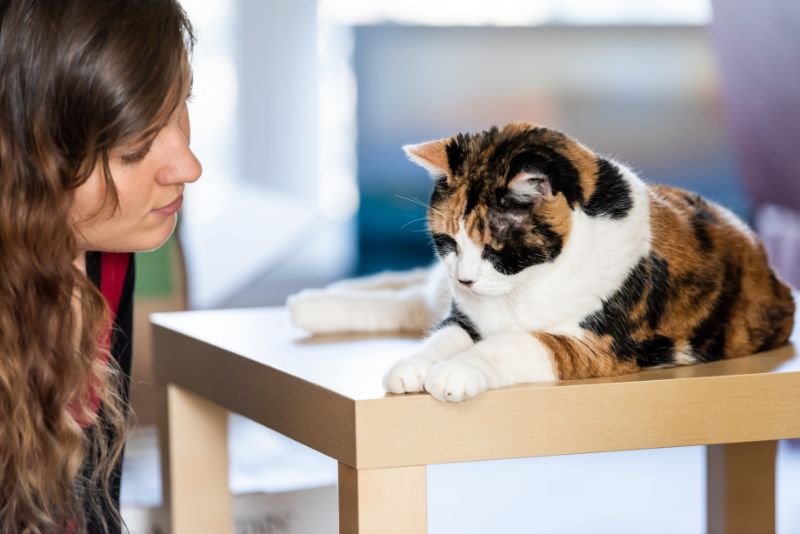Posts in Category: You & Your Pet
Pet Pee Pads: Convenient, or Not?

Training a pet to eliminate in the right place – at the right time – can be a hurdle for many pet owners. It’s not always easy, and it never happens overnight. But when it finally clicks, it’s an amazing relief for pets and owners alike. Pet pee pads can definitely help the process of house training, but they can also present certain snags to long term success.
Setting Goals
Housetraining a puppy or teaching a newly adopted grown pet is not something that can be done without time, patience, and consistent positive reinforcement.
Every pet is different and each has their own special preferences. Learning what they like goes a long way toward potty training success. Plus, this is an opportunity for pet owners to gain insight into what motivates their new best friends.
Continue…Leaving Your Dog Home Alone: Steps to Follow

As our best friends, it’s no wonder we want to take our dogs with us everywhere we go. And in this day and age, it’s nearly possible! Still, there are some times when we have to leave our dog home alone, sometimes for longer than we’d like.
So what’s a dog owner to do?
Luckily, there are ways to leave your best friend at home responsibly, without returning to chewed up shoes and stains on the carpet. Come alone with Leon Valley Veterinary Hospital as we show you steps to follow for safely leaving your dog home alone.
Continue…Do Pets Feel Guilt (and Other Complex Human Emotions)?

A dog owner generally knows when their pup did something they knew was wrong. With tucked ears, droopy eyes, and a sad-looking scowl, their admission of naughtiness is written all over their face. But while the appearance of shame is super obvious to us, experts aren’t convinced that pets feel guilt the same ways that we do. That doesn’t mean, however, that pets don’t have their own versions of an emotional spectrum.
Continue…Ear Mites and Other Things You May Find in Pet Ears

Cleaning your pet’s ears periodically is a part of good pet hygiene and is also a great way to be sure that you are picking up on problems as quickly as possible.
When performing this maintenance task, you may run across a few things you need to know more about. Leon Valley Veterinary Hospital wants you to know what to do with what you might find in pet ears.
Continue…Tough Pill to Swallow? Pill Pockets (and Other Schemes) To Change the Game

If you’ve ever watched a vet or tech administer medication, it can look remarkably easy. That is, of course, until you try it at home. The animal in need of a pill seems to have found a new hiding spot, or catches a whiff of the “yucky stuff” and protests with clenched jaws. You might be able to fool them by mixing their medication in with their food or, better yet, a special treat, but their cleverness always prevails. Half-eaten dishes or discarded treats may reveal that they managed to eat around the pill.
Fortunately, pill pockets and other trickery offer great solutions to getting a picky pet to take their medicine.
Miss a Dose?
When animals miss doses of necessary medication designed to heal or safeguard health, progress can be upended, or they can be exposed to certain health complications. It’s important that they consistently receive the right dose at the correct time.
Saving Time and Money
Ensuring that your pet receives their timely medication reduces the negative impact of missed doses on their overall health – and your wallet. Administering medication at home doesn’t have to be fraught with confusion, frustration, or unfortunate results.
Pill Pockets
Animals are highly food-motivated. As long as you are able to successfully mask the look and smell of medicine, most pets will happily gobble up whatever you’re trying to give them. And if peanut butter gobs or chicken meat bundles aren’t their jam, look no further than the ingeniousness of modern-day pill pockets.
Disguised Dosages
Masking the scent of unsavory, bitter, or bland medication is as easy as inserting a pill into a pocket of tasty goodness. Greenies Pill Pockets are always a safe bet. Simply squeeze the treat around a pill and watch the magic go down!
Other Cheats
Sure, some pets don’t think twice about eating garbage or feces, but try to give them a pill and they turn up their nose.
- Show them a pill in one hand.
- Let them sniff it.
- Cover up another pill in a squished up gob of grated cheddar or unsweetened peanut butter.
- Give them a choice to either eat the pill straight, or the delicious treat that happens to be medication in disguise.
You can try grinding up the pills into a powder and sprinkling it on their food, but make sure to check with your veterinarian first. This method can have mixed results (and it’s crucial they get their full dose every time).
Watch and Learn
If pill pockets don’t work, and they aren’t taking the bait on any other treats, use a pill dispenser or gently use your own hands:
- Place the pill between your thumb and forefinger.
- Gently pull back on your pet’s head to straighten out their neck.
- Open their mouth and carefully drop the pill at the back of the throat (where the back of the tongue meets the palate).
- Sweetly rub the throat in a downwards motion to help the pill go down.
Please let your Leon Valley Veterinary Hospital team know if you need help with pill pockets or other methods for safe, successful medication administration. Some prescriptions can be given trans-dermally or in compounds from special pharmacies.
The relationship between you and your pet will stay strong when you give them great alternatives for taking medicine or supplements they need. Good luck!
5 Ways to Score A Pet-Friendly Rental

A recent search for a pet-friendly rental on Apartments.com yielded tons of results – and that’s just in (and around) San Antonio! That’s great news for a pet owner, especially because landlords and property management organizations are generally perceived as “anti-pet”.
With potential for significant damage, disruption and conflict, what can prospective renters do to win over landlords or management companies?
Let’s Stay Together
It can be challenging to find the right pet-friendly rental. In fact, it’s one of the most tragic reasons for re-homing or surrendering a beloved pet to the animal shelter.
Continue…Dogs Eat Weird Stuff… Should You be Worried?

Some dogs go through life like the velociraptors in Jurassic Park. They might not be quite as terrifying, but they do tend to eat everything in sight. Most of the time, this perfectly normal canine behavior doesn’t result in anything too awful.
However, when dogs eat weird stuff, they can find themselves in some pretty big trouble. We’re here to help dog owners understand the difference and know when it’s time to intervene.
Continue…The Ick Factor: Why Do Dogs Eat Poop (And Other Gross Things)

Have you ever been the recipient of a big wet dog kiss and simultaneously realized your dog just ate cat poop (or worse)? We can’t believe they do it, and don’t understand why. But one thing’s for sure, some dogs sure seem to enjoy it – even with our loud protests.
It turns out this disgusting habit is just another result of natural dog behavior. At Leon Valley Veterinary Hospital, we explore this phenomenon and what pet owners can do about it.
Continue…Vaccinations and Preventives for Indoor Pets: Are They Really Necessary?

“Why does my pet need vaccines and flea prevention if she never goes outside?” This is a common question that indoor pet owners ask their veterinarian. And although it may seem as if monthly preventives for fleas, ticks, and heartworm as well as keeping vaccines current are a waste of money, the reality is that being indoors does not eliminate the risk of infectious disease or other parasite related problems for indoor pets.
Year round parasite control and a vaccination program are integral parts of your indoor pet’s health care plan. And because some parasites and infectious diseases are transmissible to humans, Leon Valley Veterinary Hospital is certain that keeping your pet protected also protects your family.
Continue…The Unthinkable: Avoiding a Stolen Pet

We all know that February 14th is Valentine’s Day, but did you know it is also Pet Theft Awareness Day? It is estimated that 2 million pets are stolen each year. This unthinkable tragedy is also a call to awareness for loving pet owners.
Depending on breed, pets can be stolen for fighting, used for breeding, or for their high price tags. In many other cases, they are simply taken home as pets or given as gifts.
Many of these pets never find their rightful homes. Although you may think it’s unlikely as you supervise your pet, there are still many situations that may put a pet at risk. Pet theft can happen anywhere and at any time, and all it takes is a few seconds.
At Leon Valley Veterinary Hospital, we can’t even imagine this happening to our pets, so we want to offer you some tips for how to keep your pets safe, here.


